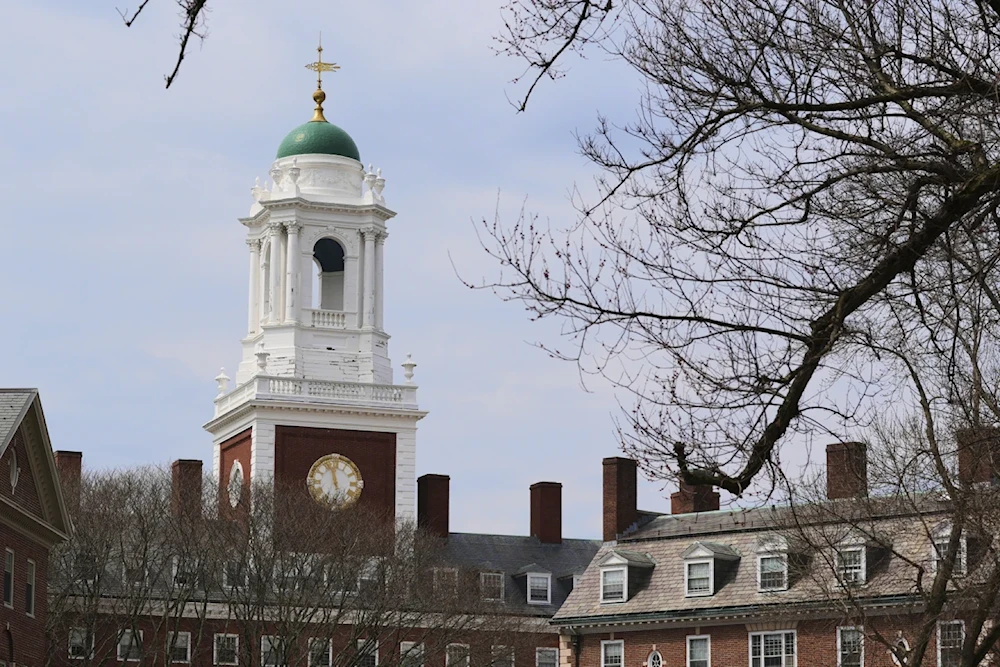US will pay the price for Trump’s universities attacks: The Times
Simon Nixon argues that the Trump administration’s attacks on US universities fuel a brain drain, erode America’s technological leadership, and accelerate China’s rise as a global tech powerhouse.
-

Spring buds appear on a tree near Eliot House, rear, at Harvard University, April 15, 2025, in Cambridge, Massachusetts (AP/Charles Krupa)
In an article for The Times, Simon Nixon delves into the significant long-term impacts of the Trump administration’s aggressive stance toward American universities. Nixon warns that the policies currently targeting academia could lead to a severe erosion of America’s productivity, technological leadership, and innovation capabilities.
Drawing on historical analogies, he argues that the Trump administration’s “assault” on higher education is reminiscent of China’s Cultural Revolution, where the ruling regime undermined the country’s intellectual elite, with disastrous long-term effects.
As Nixon states, the US is currently facing a scenario where "many of America’s most prestigious schools have seen their funding cut without warning or explanation," a move that jeopardizes vital scientific programs across the country.
He points out that the Trump administration’s actions have been particularly damaging, as “international academics and students have had their residency rights questioned or visas revoked and then reinstated.” This chaotic environment, Nixon suggests, creates uncertainty and drives valuable talent away from US institutions.
While Nixon admits it may be an exaggeration to compare the Trump administration’s policies to China’s Cultural Revolution, he shows the profound risk to the US economy in the longer term: “No US scientists are being sent to work in paddy fields, but many are being pushed out or made to feel unwelcome.”
This shift, he argues, could lead to a severe "brain drain," with talented scholars seeking refuge in Europe, Canada, and other global centers of research.
In particular, he highlights how the European Union is already capitalizing on this opportunity. Ursula von der Leyen's unveiling of the €500 billion “Choose Europe for Science” initiative is a clear signal that the EU is eager to attract top scientists from the US, a development that Nixon argues further exemplifies the risks of America’s policies.
Long-term threat to US technological leadership
One of Nixon’s most poignant observations is the impact of these policies on the future of scientific and technological progress in the US, noting that "three-quarters of more than 1,600 US-based scientists said they were considering looking for jobs elsewhere,” based on a survey published in Nature.
This sentiment, according to Nixon, poses a direct threat to the US’ continued technological dominance. He remarks, "In the near-term, Trump’s ‘Cultural Revolution Lite’ is unlikely to affect the technological leadership that has been the source of the US’s economic outperformance in recent decades,” but warns that the longer-term consequences will be far-reaching.
Nixon draws a direct connection between the erosion of scientific infrastructure in the US and the rise of China’s technological prowess.
He writes, “China today is the beneficiary of a ‘reverse brain drain’ that has seen record numbers of US-trained scientists returning to China,” noting that US-trained professionals are flocking back to China due to the country’s increasing investment in science and technology.
This influx of returning talent, combined with substantial government backing, has allowed Chinese institutions to rise in global rankings, particularly in artificial intelligence and China's semiconductor manufacturing.
America’s emerging brain drain: a repeat of Britain’s post-war struggles
To emphasize the gravity of the situation, Nixon compares the current US environment to that of post-war Britain, which suffered from a significant brain drain in the 1960s. He notes that "the term ‘brain drain’ was first coined by the Royal Society in 1963 in a paper on the emigration of scientists from post-war Britain.”
Nixon connects this historical event to the current exodus of scholars from the US, suggesting that America may be on a similar trajectory unless its policies change. He continues, “The danger arising from the Trump administration’s war against its perceived US-university enemies is not just that it drives some American academics to look for jobs elsewhere, but that it encourages the next generation of the world’s brightest students to further their education in China.”
He highlights how this shift toward China has already begun, mentioning that "many of the people who have led China’s technological renaissance trained in the US," offering the example of Zhang Rujing, a former Texas Instruments employee who played a key role in establishing China’s semiconductor industry.
This paradox, Nixon points out, is a consequence of the Trump administration’s policies, which have incentivized Chinese scientists to return home by limiting their opportunities in the US.
Irony of US-China tech rivalry: How Trump’s policies fuel China’s rise
Finally, Nixon stresses the irony of the situation: the US is unintentionally fueling the rise of Chinese technology, despite Trump’s repeated claims that China has stolen American intellectual property.
He writes, "The irony, of course, is that China has America to thank for much of this remarkable explosion in innovation," warning that if current trends continue, the US could soon find itself at a severe disadvantage in the global technological race, as China’s universities climb in prominence and attract an increasing number of world-class scientists.
Nixon finishes off by arguing that the Trump administration's hostility toward academic institutions, international scholars, and scientific funding will not only harm the US in the short term but could cause irreparable damage to its long-term technological leadership, warning that "History suggests that revolutions, once started, are hard to stop," drawing a stark parallel with the devastating effects of China’s Cultural Revolution on its own scientific and technological infrastructure.
Without a course correction, Nixon predicts, the US could soon find itself losing its competitive edge to countries like China, which is rapidly gaining ground in critical technologies.

 6 Min Read
6 Min Read










